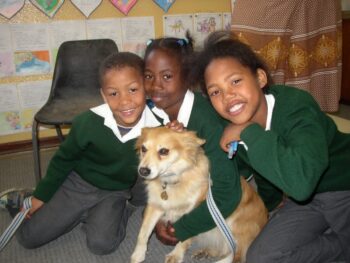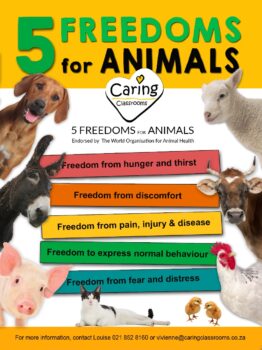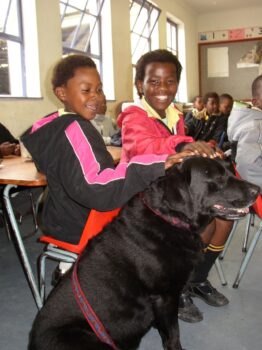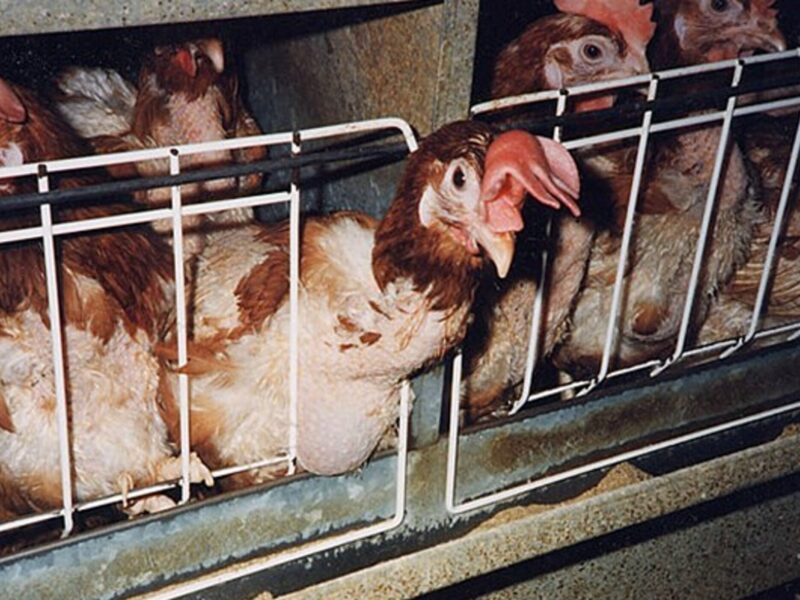
Justice for animals – not just kindness

Young primary pupils from Marine Primary School, Cape Town with therapy dog Vicky. | Credit: Dr Yvonne Robson
To celebrate International Day of Charity (5 September) I’m privileged to share information on the wonderful work of South Africa’s Humane Education Trust of which I’ve recently become a patron. I’m honoured to introduce this guest article by its founder, Louise van der Merwe, who also heads up Compassion’s South African partner, Animal Voice.
For three decades The Humane Education Trust has tried to create a kinder society in South Africa through awareness and education. However, it is only in the last three years that we feel we have had a breakthrough and are reaching meaningfully into the hearts and minds of our children.
To give some background as to who we are, we have to go back to the late ‘eighties when the sight of debeaked hens was shocking enough to launch me into a career that would open my eyes to a devastating world of callous exploitation of animals, human entitlement and disregard for animal suffering. With just a few supporters, we launched our magazine Animal Voice aimed at creating awareness among consumers of cruel practices in the food chain. At the same time, we focused on education. Animal welfare simply did not feature in any part of the national schools’ curriculum.
Equipping educators for a world where nonhumans matter
Over the decades, we have succeeded in incorporating animal care into the national curriculum from five-year-olds right through to 17-year-olds. Our resources are officially included by the Department of Education as Learner-Teacher-Support-Material and are used in schools across the country.
We have put our hearts and souls into bringing about a kinder and a more just society, firm in our belief that with enough effort, enough love, enough commitment, enough staying-power, we would succeed in revitalising the nation’s seemingly abandoned sense of humanity.
In his book, Animal Rights Education, Professor Kai Horsthemke, a visiting professor at the Wits School of Education in Johannesburg, concludes: “Virtually all education leaves students with the idea that there is a clear division between humans and nonhumans and that nonhumans are subordinate.”
I could not agree more. The education system seems blind to the fact that how we treat those who are at our mercy, is the truest reflection of who we are as individuals, communities and nations. Ultimately, humane education is about us. It’s about our dignity. It’s about the quality and worth of the human race itself.
So, where to from here?
I mentioned earlier that we had had a break-through in our teaching of humane education. And this is it: some time ago, Professor Horsthemke suggested that in the teaching of humane education, the emphasis should not be on kindness. Instead, we should teach:
- Justice – not just kindness
- Respect – not just compassion
- Rights – not just protection

Credit: The Humane Education Trust
The five freedoms
To my mind, the closest the world has come so far to Justice, Respect and Rights for domesticated nonhumans is with the Five Freedoms for Animals that have been influential in international animal welfare:
- Freedom from Hunger and Thirst
- Freedom from Discomfort
- Freedom from Pain, Injury and Disease
- Freedom to Express Normal Behaviour
- Freedom from Fear and Distress
I believe these five principles are the closest we have to date, to eliminating from our psyche, our sense of callous entitlement to nonhuman lives.
Unlike ‘kindness’ which can be given or withdrawn, the Five Freedoms convey a sense that it is the birth right of every living being in our care, to live comfortably and without distress.
There is a sense of justice in this that children readily understand.
We launched a pilot project based on The Five Freedoms for Animals that has evolved a new understanding in children. One teacher explains, by way of example, that she overheard a discussion in the playground. A dove was sun-bathing nearby, extending its wings to catch the rays of warmth. Two nine-year-old boys saw this and the one said to the other: “See! That’s Freedom from Pain, Injury and Disease”. “No,” argued the other. “That’s Freedom to Express Normal Behaviour.” Our teaching had opened a new window of curiosity for them that would otherwise have remained closed. Without it, the boys would probably not have even noticed the bird or may well have thrown a stone at it.

Pupils from Ukhanyo Primary School with therapy dog Guinness | Credit: Dr Yvonne Robson
Educating the mind and the heart
We have found that children spontaneously extrapolated their understanding of the Five Freedoms not only to other animals, but to themselves too! It opened their minds to a variety of new concepts – like the meaning of ‘sentient being’. “Don’t bully me,” I heard one small girl say. “I’m a sentient being. I have feelings too.” It was said in all earnestness. She understood the Five Freedoms and their implications better than she understood her own child rights in the South African Constitution. What she said was something no-one could argue about and the young bully boy was stuck for a retort!
We invited children taking part in our pilot to advise us whether they felt it important for learners to know about the Five Freedoms, 100% replied in the affirmative. These replies were among the reasons they gave:
- Because if you help animals you will become very kind and help people too.
- Because I know now how to treat my dog.
- Because now I can teach my uncle about the Five Freedoms when he beats his donkey.
The Humane Education Trust would like to see the five freedoms for animals become a basic learning requirement for all young people, along with their 123’s and their ABC’s. To hasten the process, we have started uploading our lesson plans for early learning in an online power point format for free and the escalation in downloads by teachers has been heart-warming to say the least.
After all, Aristotle said it more than 2000 years ago: “Educating the mind without educating the heart is no education at all.”
To find out more and to support the work of the Humane Education Trust please visit: https://www.animalvoice.org/





